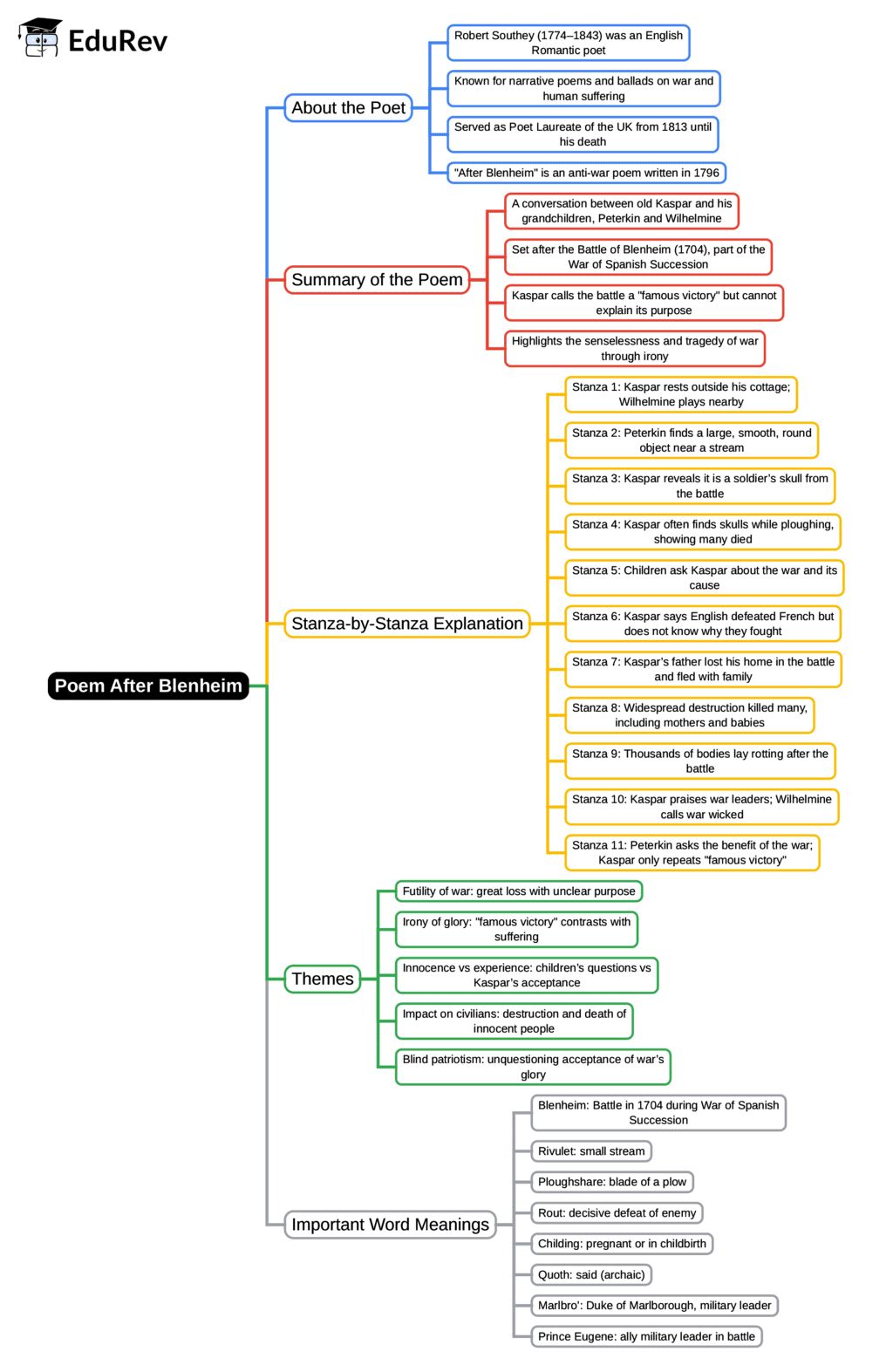Class 10 Exam > Class 10 Notes > English Class 10 ICSE > Mind Map: After Blenheim
Mind Map: After Blenheim | English Class 10 ICSE PDF Download

The document Mind Map: After Blenheim | English Class 10 ICSE is a part of the Class 10 Course English Class 10 ICSE.
All you need of Class 10 at this link: Class 10
|
81 videos|322 docs|60 tests
|
FAQs on Mind Map: After Blenheim - English Class 10 ICSE
| 1. What are the main themes explored in the poem "After Blenheim"? |  |
Ans. The poem "After Blenheim" explores several significant themes, including the futility of war, the impact of conflict on humanity, and the contrasting perspectives on glory and suffering. It highlights how war, despite being glorified, brings about destruction and loss, leaving behind a legacy of pain and confusion. The dialogue between the characters, particularly the grandfather and the child, emphasizes the generational effects of war and the struggle to comprehend its meaning.
| 2. How does the poem depict the consequences of war on individuals and society? |  |
Ans. The poem vividly illustrates the consequences of war through the experiences of the grandfather, who recounts his memories of the Battle of Blenheim. The poet portrays the physical and psychological scars left on individuals, as well as the broader societal impact such as the loss of life and the haunting memories that persist. The child’s innocent questions juxtaposed with the grandfather's somber reflections underscore the disconnection between the glorified narratives of war and the harsh realities faced by those who endure its aftermath.
| 3. What role does the character of the child play in "After Blenheim"? |  |
Ans. The child in "After Blenheim" serves as a symbol of innocence and curiosity. Through his questions, the child represents a new generation that seeks to understand the past but is met with the complexities and harsh truths of war. His perspective highlights the disconnect between the glorified notions of battle and the grim realities experienced by those who lived through it. The child's innocence also contrasts sharply with the grandfather's painful memories, emphasizing the need for understanding and reflection on the consequences of war.
| 4. How does the poem "After Blenheim" challenge the glorification of war? |  |
Ans. "After Blenheim" challenges the glorification of war by presenting it as a source of suffering rather than honor. The grandfather’s recounting of the battle focuses on the destruction and loss, rather than any sense of glory or valor typically associated with warfare. The poem’s imagery and tone reveal the devastating impact of war on individuals and families, undermining the romanticized ideals of heroism and bravery. This critical examination invites readers to question the narratives surrounding war and consider its true cost.
| 5. What literary devices are used in "After Blenheim" to convey its messages? |  |
Ans. The poem employs various literary devices to effectively convey its themes and messages. Imagery is used to create vivid pictures of the battlefield and its aftermath, allowing readers to viscerally feel the impact of war. The use of dialogue between the grandfather and the child highlights contrasts in understanding and experience. Additionally, irony is a key device, as the title itself suggests a positive outcome from the battle, while the content reveals sorrow and loss. These devices work together to deepen the reader's engagement with the poem's critical perspective on war.
Related Searches




















